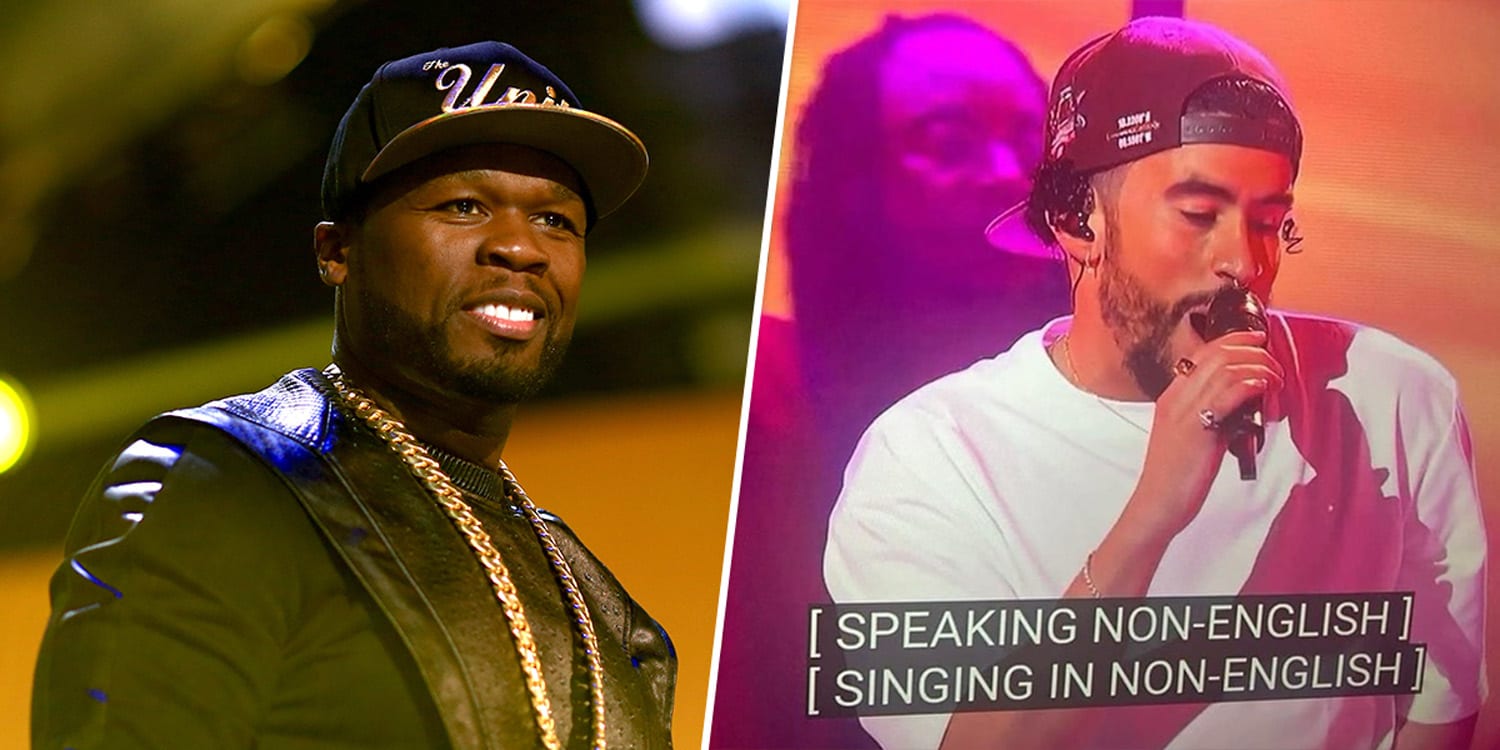Bad Bunny vs. 50 Cent: The Cultural Clash That Shook the Internet After a Super Bowl Comment Went Too Far
When Bad Bunny stepped onto the Saturday Night Live stage, few could’ve predicted that a single sentence would ignite one of the most heated cultural debates of the year. With his trademark smirk and boundless charisma, he looked into the camera and said,
“You have four months to learn Spanish if you wanna understand my lyrics at the Super Bowl.”
The line was clearly delivered in jest — a playful challenge to his global fan base. But within minutes, that moment had been clipped, shared, dissected, and debated across every corner of the internet.
By the next morning, #LearnSpanishChallenge was trending on X (formerly Twitter). Some fans applauded the artist’s confidence, praising him for representing Latino culture on one of the biggest stages in entertainment. Others, however, felt the comment crossed a line — calling it “arrogant,” “divisive,” or even “un-American.”
And then, like a storm from the early 2000s, 50 Cent entered the chat.
The Internet’s Favorite Instigator Returns
Curtis “50 Cent” Jackson is no stranger to controversy. The rapper, known as much for his chart-topping hits as for his unfiltered opinions, saw Bad Bunny’s viral moment as an opportunity to speak up — and to stir the pot.
In his first post, 50 appeared to keep things civil:
“Look, I respect what he’s doing,” he wrote. “But telling Americans to ‘learn Spanish’ for the Super Bowl? Bro, this ain’t Duolingo halftime.”
Within minutes, his comment went viral — not just because of what he said, but how he said it. Fans could almost hear his trademark laugh behind the words, the same energy that once fueled rap feuds and made him one of hip-hop’s most notorious provocateurs.
But 50 wasn’t done. He followed up with another post that landed like a knockout punch:
“Last time I checked, music’s supposed to bring people together, not make us download Rosetta Stone.”
That line — half savage, half comedic — instantly set social media ablaze.
The Culture War Beneath the Jokes
While the exchanges seemed playful on the surface, they quickly exposed deeper tensions about language, identity, and representation in pop culture.
For years, Latin music has been steadily reshaping the global music landscape. Artists like Shakira, J Balvin, Karol G, and now Bad Bunny have taken over global charts, proving that music in Spanish can dominate without translation.
Yet, some American audiences still expect global artists to “adapt” to English-speaking markets. Bad Bunny’s joke struck directly at that expectation — and forced a question that many had avoided asking:
Why should a Puerto Rican artist performing on an international stage have to sing in English to be accepted?
For millions of fans across Latin America, his remark was more than a punchline — it was a declaration of pride. A reminder that Spanish, too, belongs on the world’s biggest stage.
But for others, especially those unfamiliar with his humor or cultural background, the tone felt exclusive — like a gatekeeping moment rather than an invitation.
This clash between cultural pride and public perception is what turned a 10-second joke into a national debate.
The Power of Language in Music
Bad Bunny has long been an artist who refuses to conform. His lyrics are unapologetically Puerto Rican — blending slang, rhythm, and attitude that doesn’t cater to translation. And that’s precisely what his fans love most.
But his rise also reflects a generational shift. Younger audiences, fueled by global streaming platforms, are far more open to music beyond English. Whether it’s Korean pop, French rap, or Nigerian Afrobeats, fans today connect through emotion rather than language.
That’s why, despite the controversy, many defended Bad Bunny’s comment. To them, it wasn’t arrogance — it was empowerment. A reminder that culture flows both ways now.
One viral tweet put it best:
“If we can memorize the lyrics to ‘Despacito,’ we can handle a Super Bowl in Spanish. Chill, 50.”
50 Cent’s Humor and the Generational Divide
Meanwhile, 50 Cent’s reaction revealed another cultural layer — a generational one. His brand of humor, sharp and sarcastic, resonated with fans who miss the days of public clapbacks and musical rivalries. To them, his comments weren’t hateful — they were classic 50, raw and funny.
Still, others saw it differently. Some accused him of dismissing the importance of cultural diversity, arguing that the Super Bowl has always been a reflection of evolving American identity — one that’s now undeniably multilingual and multicultural.
In truth, both artists were expressing something valid. Bad Bunny was celebrating pride in his heritage; 50 Cent was defending a vision of unity he believes music should represent. The real story lies in how those two ideas can coexist.
The Bigger Picture
What makes this clash fascinating isn’t the feud itself — it’s what it says about where music is headed. For the first time in history, non-English songs dominate global playlists. The top charts are increasingly bilingual, trilingual, or language-blending.
In that sense, Bad Bunny’s joke wasn’t just about Spanish — it was about the future of pop culture. The next generation of artists isn’t asking for translation; they’re asking for acceptance.
And as for 50 Cent? His comments remind us that humor, too, has its cultural boundaries. What one person sees as a joke, another may see as a challenge. But in the end, both sides agree on one thing: music’s real power lies in connection — and sometimes, connection begins with a little discomfort.
As one fan perfectly summed up online:
“You don’t have to understand every word to feel every beat.”
Maybe that’s the point Bad Bunny was trying to make all along.
Source: Original story adapted from viral social media posts and entertainment news coverage.
